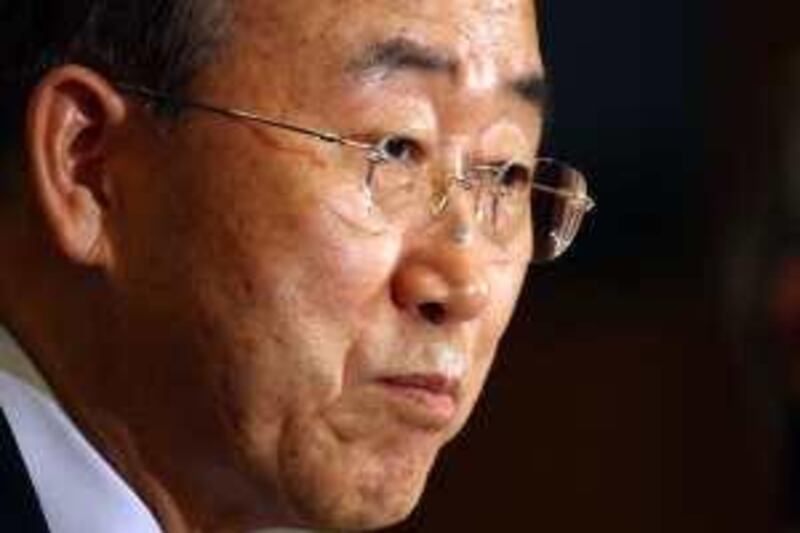NEW YORK // As Ban Ki-moon travels to Myanmar tomorrow in a bid to have its military rulers embrace political reforms, the UN secretary general is under mounting pressure to clinch a much-needed diplomatic success. Halfway through his first term, the UN leader is being criticised because of his lack of progress with regimes, such as the junta in Myanmar. The expectation is that Mr Ban's trip will yield concessions from Myanmar's military rulers, though it is possible the junta will use the visit to legitimise the trial of the opposition leader Aung San Suu Kyi. Speaking in Japan on Tuesday, the secretary general outlined "three of the most important benchmarks" he hopes to achieve during two days of talks with the junta leaders. "They should release all political prisoners including Aung San Suu Kyi, they should immediately resume the dialogue between the government and opposition leaders and they should also create an atmosphere, political as well as a legal framework, conducive to the credible election which needs to be taken next year in a most objective, transparent and democratic manner," he said. The UN leader has been seeking to return to Myanmar since his first visit in May 2008 after Cyclone Nargis, which left almost 150,000 dead. His special envoy to Myanmar, Ibrahim Gambari, has travelled there eight times since being appointed in 2006 but has achieved little in terms of democratic reforms. The junta violently quashed a peaceful uprising by monks and students in 2007 and the number of political prisoners is reported to have doubled to more than 2,000. Mr Gambari's most recent visit, last week, was shrouded in secrecy. The UN envoy was believed to be negotiating a deal that would enable Mr Ban to secure a concrete outcome from his visit. It is not yet known whether it will include the release of political prisoners or relate directly to Ms Suu Kyi, the Nobel Peace laureate whose trial for breaking the terms of her house arrest was to resume tomorrow. She has been in prison or under house arrest for much of the past two decades and was put on trial again recently on charges that she allowed an unauthorised guest to stay at her home on May 4. Western governments have dismissed Ms Suu Kyi's prosecution as a "show trial" intended to keep her out of multi-party elections planned for next year. Critics say they will entrench almost half a century of army rule in the country, formerly known as Burma. Mr Ban acknowledged "concerns about the timing" of his visit coinciding with the trial, but pledged to "raise in the strongest possible terms ? the concerns of the international community". With diplomats at the UN assessing whether he has enough support to run for a second term as secretary general, Mr Ban is under some pressure to score a diplomatic triumph. Mr Ban has been accused of having not condemned Sri Lanka's government during its recent offensive against the Tamil Tigers, which left thousands of civilians dead this year during the endgame of its 26-year ethnic civil war. During a press conference this month he blamed any perception of stalled progress on world powers for failing to support his endeavours. He said his job is "just impossible". Suzanne DiMaggio, a policy analyst from the New York-based Asia Society, said Mr Ban cannot "come back empty-handed". But Ms DiMaggio is concerned that the junta has little interest in reform and Mr Ban's visit will probably not change anything if such regional powers as India and China do not provide political leverage. Steve Crawshaw, a UN expert from the advocacy group Human Rights Watch, said Mr Ban needed to secure real concessions from the junta, including the release of Ms Suu Kyi and other political prisoners. "Ban Ki-moon is very well meaning and has an extraordinarily difficult task. In the past, and that includes in Sri Lanka, he has seemed so eager to be courteous to his hosts that this has reduced the possible pressure for change," he said. "I hope that he will be mindful of that and will do everything possible to ensure that the Burmese junta is not able to trumpet this visit as some kind of success without granting any real concessions." jreinl@thenational.ae
Ban expects Myanmar concessions
Military Junta will be told to release political prisoners, including Aung San Suu Kyi, talk to the opposition and allow credible elections.

Editor's picks
More from the national





